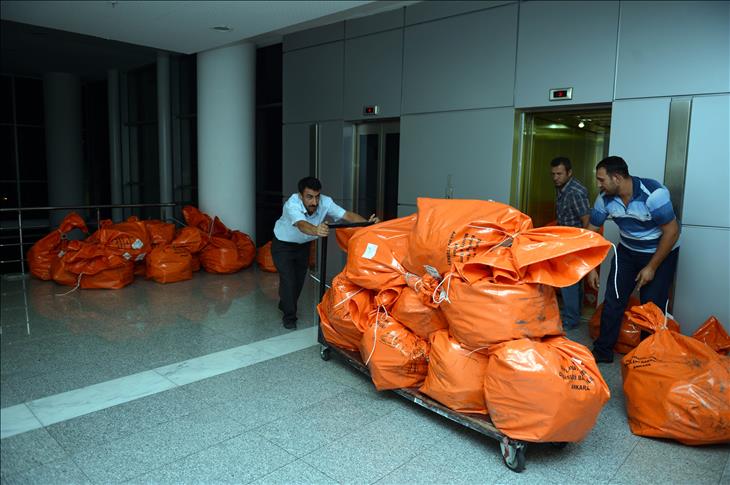Hype fails to match reality for Turkey's overseas voters
Logistics, travel times and red tape blamed for lower-than-expected presidential vote turnout among Turkey's nationals abroad.

By Furkan Naci Top
ISTANBUL
In late May, some 18,000 Turkish people filled the Lanxess Arena Sports Hall in the German city of Cologne where their country’s prime minister, Recep Tayyip Erdogan, gave a speech to a crowd of cheering supporters. Outside, there were tense scenes as thousands of other Turks protested against him.
Fast-forward three months and this heady atmosphere was expected to be reflected at the ballot box in the race to become Turkey’s first directly elected president. However, a low turnout has been reported from special overseas voting centers which were opened from Thursday to Sunday.
As the turnout figures appeared, the huge rumble about the mainly Europe-based Turkish diaspora's attention turned out to be an illusion, as only a small section of Turkish overseas nationals went to vote.
Three major reasons behind the low turnout were: a voting system bound to appointments; logistical problems; and a certain "listlessness", according to Turkish political researcher, Galip Dalay.
Out of an almost 2.7-million-strong Turkish diaspora only 232,000 of them voted, according to deputy Prime Minister Emrullah Isler. More than 150,000 people so far have also gone to polling stations set up on Turkey’s border crossings, which are open until election day on August 10.
This has cost the Turkish state; according to one Turkish newspaper, the costs involved of one vote cast overseas was 38 times higher than a single vote in Turkey itself due to the low turnout. A vote abroad cost the state on average almost US$140, while the cost in Turkey was less than US$4. Turkey had allocated US$185 million for election expenditures – more than US$30 million of this was ringfenced for overseas expenses, said reports.
Taking into account over 52 million eligible voters in Turkey, the diaspora vote matters for political parties since it makes up five percent of the total.
Some voters faced travelling long distances to reach the voting centers in 103 parts of 54 countries around the world, but the motivation for spending hours on road – or even flying internally – was low, according to Dalay, who works for the Turkish Foundation for Political, Economic and Social Research.
In Germany, which hosts nearly three million Turks, there were seven voting centers and for some people it was further than they could travel, said a 34-year-old Turkish resident in Dusseldorf, Hilal Kilic, who has spent the last 18 months abroad.
Kilic said the appointment system was a failure, for many people returned without having cast their vote as they were late and were turned away. In August, many of the 1.4 million elligible voters in Germany had also left for vacation, she claimed.
A similar problem was faced in Australia, according to one Turkish resident in the country, who had to fly 3,500 km to cast his vote.
"This is a civic duty. I came to vote regardless of any difficulty [about] the cost or the distance," Salih Arslan told AA, who lives in Perth, the capital of Western Australia.
Turkish citizens were required to get an appointment prior to the election period from embassies in their countries; however, some of them did not even know about it.
"A more reasonable and up-to-date system could have been in effect for Turks," Dalay says, citing the U.S. example, whose citizens can vote online. Estonia and the Netherlands also using online voting.
"[Turkey’s] High Election Board's decision diminished already-low motivation," said Dalay, criticizing the board's strict practice.
Many people were not allowed to vote if they missed their appointment time. The board had earlier rejected the ruling AK Party's appeal for appointment-free date for voters.
Although voting in person is the most common way for diaspora participation, proxy and postal voting are other methods which enable overseas citizens to cast their ballots, and are used by more than 60 countries, according to the Overseas Vote Foundation.
The election atmosphere in Turkey has been more relaxed compared to prior contests, particularly the bitterly fought March 30 local elections.
Dalay said this month’s calmer election atmosphere has also spread to the Turkish diaspora.
According to the researcher, the outcome over the turnout is unexpectedly low due to "listlessness" as Erdogan is highly anticipated to win against his biggest rival – opposition parties' joint candidate Ekmeleddin Ihsanoglu, whose nomination disturbed some opposition grassroots.
The latest polls ahead of the August 10 election suggest that Erdogan will beat his rivals, securing the presidency with a large margin.
Voter turnout in Turkey is generally high - nearly 90% in the latest March 30 elections - since Turkey is going through a "transitional period" according to Dalay.
Anadolu Agency website contains only a portion of the news stories offered to subscribers in the AA News Broadcasting System (HAS), and in summarized form. Please contact us for subscription options.

